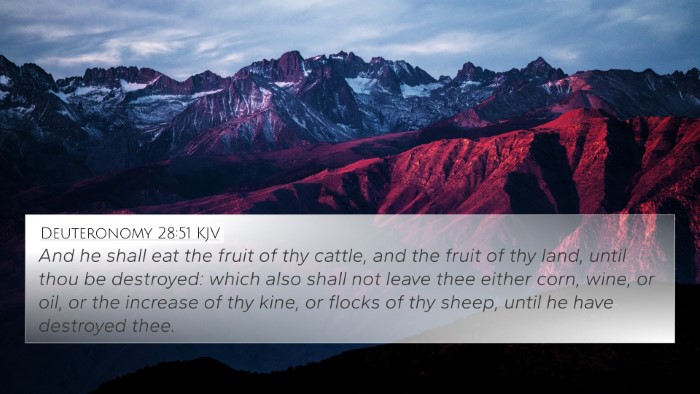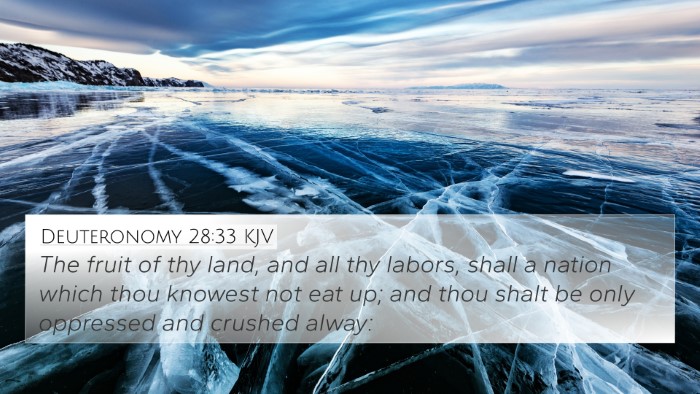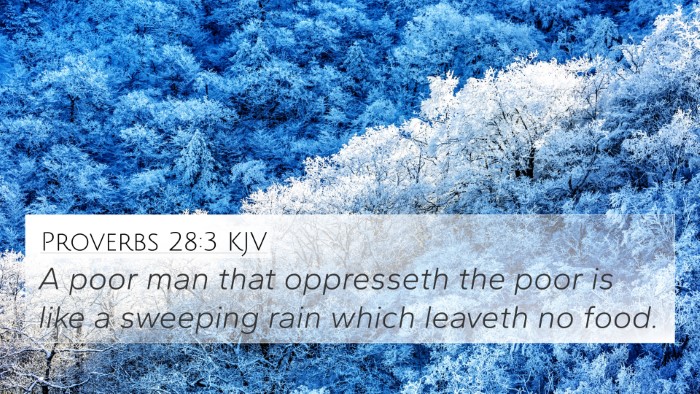Meaning and Interpretation of Judges 6:4
Judges 6:4 states, "They encamped against them and destroyed the increase of the earth, till thou come unto Gaza, and left no sustenance for Israel, neither sheep, nor ox, nor ass." This verse is within the narrative of Gideon, where the Midianites oppose Israel, highlighting themes of oppression and divine intervention.
Contextual Understanding
The background of this verse lies in the Israelites' struggles during the time of the Judges. The Midianites, described as a formidable foe, ravaged the land of Israel, emphasizing the dire state of Israel's rebellion and the consequent judgment from God.
Insights from Commentaries
Matthew Henry's Commentary
Matthew Henry observes that the Midianites’ invasion exemplifies the consequences of Israel's disobedience to God. Their actions symbolized more than mere physical destruction; they represented a spiritual vacancy, where reliance on God was shifted to fear and oppression. Henry notes that God's withdrawal of blessings often leads to loss, which is demonstrated here as the sustenance is removed.
Albert Barnes' Notes
Albert Barnes emphasizes the systematic devastation wrought by the Midianites. He points out that their invasion not only resulted in material scarcity but fundamentally threatened the survival of Israel. This loss, he argues, serves as a call to repentance for the Israelites, reminding them of their covenant relationship with the Lord and the need to turn back to Him in their distress.
Adam Clarke’s Commentary
Adam Clarke elaborates on the implications of this verse, highlighting the absence of basic necessities like sheep, ox, and donkey. He underscores the Midianites’ intent to starve Israel into submission, further driving home the desperation and helplessness experienced by the Israelites. Clarke invites readers to reflect on the transformative nature of God’s intervention, which occurs when the people finally cry out to Him.
Bible Cross-References
- Judges 2:14-15: Discusses God's anger against Israel for their disobedience and how He allowed their enemies to oppress them.
- Judges 6:1: Provides context on Israel's sin leading to their oppression by the Midianites.
- 1 Samuel 12:9: Illustrates the cycle of Israel's sin and subsequent oppression; God delivered them despite their unfaithfulness.
- Psalm 106:41-43: Describes Israel's recurring cycle of sin and distress, and the Lord’s deliverance.
- Isaiah 40:27-31: Offers hope and assurance that God provides strength to those who wait upon Him.
- Romans 5:3-5: Encourages believers by connecting suffering with the development of perseverance and hope.
- Hebrews 11:32-34: Mentions Gideon's faith as a hero who helped deliver his people from oppression.
- 2 Corinthians 1:10: Highlights God's power in delivering believers from distress, paralleling Israel’s predicament.
- Matthew 6:25-26: Jesus speaks of God’s provision, reminding us not to worry about material needs.
- Philippians 4:19: Paul reassures that God will supply every need, resonating with the themes of divine provision.
Connections Between Bible Verses
The relational ties between Judges 6:4 and its cross-references illustrate a broader pattern of human need and divine provision. Each of these referenced verses contributes to an understanding of the themes present in Judges, such as human frailty, divine judgment, moral decay, and the eventual deliverance through faithful leaders like Gideon.
Comparative Bible Verse Analysis
Through comparative analysis, we see how the cycle of oppression in Judges 6:4 mirrors similar patterns in both the Old and New Testaments. The struggles of Israel can be compared to the spiritual hunger described in the New Testament, where Jesus speaks to a life of reliance on God's promises for sustenance, illustrating the continuity of divine concern for His people throughout redemptive history.
Thematic Bible Verse Connections
The rush of desperation in Judges leads to powerful themes of repentance, deliverance, and faith. These themes resonate throughout the Bible, encouraging readers to see their relevance in both historical and contemporary contexts.
Conclusion: Inter-Biblical Dialogue
The examination of Judges 6:4 inspires a rich inter-Biblical dialogue, emphasizing the importance of cross-referencing biblical texts to uncover the deeper meanings and applications. It is essential for readers to actively engage with the scripture, utilizing tools for Bible cross-referencing and methods like cross-reference Bible study to extract fuller biblical truths and enrich their spiritual understanding.
Through tools like a Bible concordance or a cross-reference guide, one can find extensive connections between verses and themes, connecting the historical context of the Judges to the larger narrative of God’s redemptive work across all scripture.












